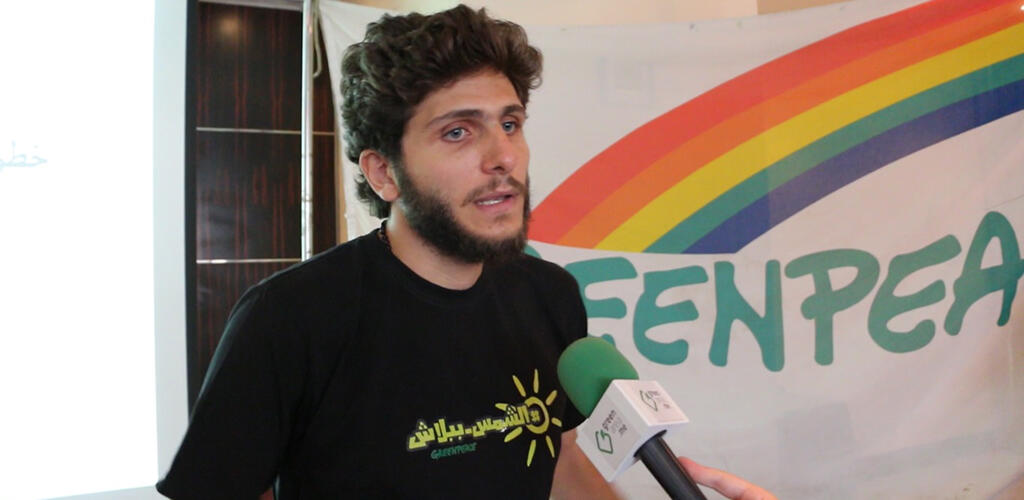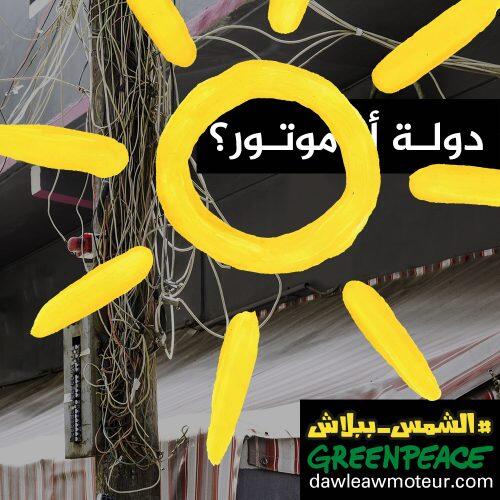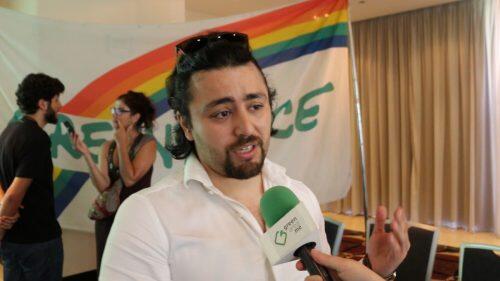“No, I do not have, but I’m thinking about it”, “because I hate noise, and I hate the smell of diesel”, “I’m still using the traditional system… When I live alone, I will install the new one”, “I do not have a home solar power system, but I want to install one” … This is how some people we interviewed responded upon asking them if they had a home solar power system.
Free Sun…
Due to all the reasons mentioned, and many others, “Greenpeace” Mediterranean launched on Wednesday the 8th of May in a media gathering it’s “Shams Bi Balesh” (The Sun is for Free) campaign along with its compelling report “Catalyzing Solar Energy in Lebanon: A first step towards a 100% Renewable Energy Electricity sector”, to raise awareness on private solar energy systems as a viable, clean and sustainable solution to the electricity crisis in Lebanon.
The environmental organization presented steps which enable Lebanon to benefit from solar energy, especially that the weather is sunny for 8 out of 12 months in this country.
But loans are still not encouraging, so what are the solutions Greenpeace is presenting?
Very few Lebanese know about it
Julien Jreissati, Greenpeace Arab world campaigner, said in an interview with “greenarea.info”: “We conducted statistics, in which we asked the Lebanese a number of questions, in order to reveal what they know about solar energy”.
“The results revealed that many Lebanese still do not know that a solar energy system exists in Lebanon, and that they can benefit from it in their homes”, Jreissati said.
He added that: “Very few Lebanese know that this technology allows them to transform solar energy into electricity, and most of them thought that it could only be used for water heating”.
On the other hand, he stressed that “there are more than 100 companies in Lebanon that facilitate the acquisition of a home solar system”, adding that “this technology is not as expensive as it was 6 years ago”.
80% lower than 2010
Through his presentation at the conference, Jreissati said that “All these years we have been living in an absurd situation, and we have overlooked a source of energy that is free, clean, renewable and available: the sun. Lebanon has more than 300 sunny days per year that could supply all our national demand, and yet we do not exploit it!”
He also stressed that “The solar energy market is growing slowly but steadily,” adding that “This growth has been plagued by myths around the cost of solar systems and their efficiency. Today, the price of a solar energy system is 80% lower than 6 years ago and is competitive with, if not cheaper than private generators”!
According to “Greenpeace” campaigner Julien Jreissati, “It’s time for people to take matters in their own hand, especially that private solar energy systems give power to the people.”
The electricity bill is tiring for us, as individuals, and the Lebanese state pays high costs for traditional energy sources … What will Lebanon save in case it relied on solar power systems as a principal source for the production of electricity?
Solar Energy can cover our demand
“greenarea.info” also interviewed Nader al-Hajj Chehade; Renewable Energy Expert, who was also consulted for “Greenpeace” Mediterranean’s campaign.
Chehade told us that “Lebanon needs 20,000 gigawatt hours/year, and solar energy can cover all this demand”, adding that “there are a number of obstacles which we should overcome before that”.
According to him, “people living in the mountains will find it easier to install a solar power system, while it will be much harder in Beirut, especially that the rooftops in Beirut cannot be enough for 10 or more houses in a building.”
“The solution”, he says, “is through approaching individuals on one hand (encouraging people to install home solar systems, even if they supplied a little part of their demand and not all of it), and on the other hand, encouraging the Lebanese state to invest in solar energy, instead of investing in fuel oil”.
Greenpeace mentioned that through its “Shams bi Balesh” campaign, it is aiming to raise public awareness around the solar potential and call on decision makers to act for the benefit of their citizens, the economy and the climate.
Home solar power system could be a solution for all of us, and them are a big investment, so would you try this eco-friendly and money-saving shift?













